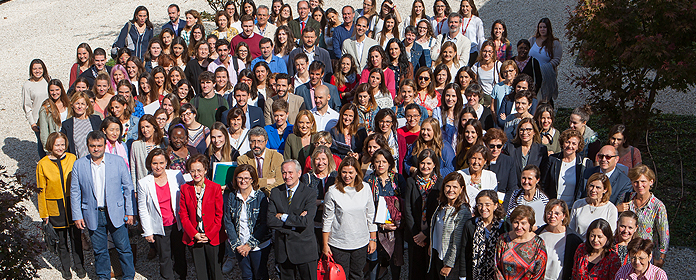17_10_9_EDU_eyp
More than a hundred people in a Service-Learning workshop
Students, teachers and social agents reflected on this educational methodology with social dimension

The School from Education and Psychology of the University of Navarra organized a conference goal with the aim of making Service-Learning as an educational methodology known to the university community (academic staff, staff of administration and services and student body). Over the course of a day, experts and representatives of the various parties involved in its implementation (academic staff, student body, community partners and other beneficiaries), had the opportunity to share their knowledge and experiences.
The Service-Learning is an educational methodology that involves a more active way of promote learning, taking into account the needs of the environment, the social needs, which have to be identified by students and teachers. In this way, the teaching acquires a civic sense, which complements a pedagogical model more focused on the individual, motivating students to be protagonists of their own learning process.
The inaugural lecture was given at position by Miguel Angel Santos, Full Professor of the University of Santiago de Compostela, who made a diagnosis of the institutionalization of Service-Learning in Spanish Universities. He pointed out that for some time now, universities have designed and implemented plans for training and improvement of academic staff."In such plans," he commented, "considerable attention has been paid to the preparation of teachers in the use of methodologies likely to activate student learning, with strategies that promote cooperative interaction among students and with the academic staff around projects. According to the expert, in this framework of renewal and reflection about the improvement of the higher Education , Service-Learning has become a methodological reference for teachers and groups. They try to connect academic learning with the realization of some service to the community, prior detection of a need in accordance with the possibilities of the content of a subject, which is worked on in the classrooms.
Regarding the satisfaction of the agents involved, the speaker stated that the academic staff makes a very positive evaluation of the introduction of this form of teaching in their classrooms, as they perceive a clear improvement in the training of these students. For its part, the student body perceives that academic learning has to do with life, and life leads to reflection and to rethinking academic learning.
Examples of ApS at the University of NavarraThe workshop was completed with communication tables that were divided by areas; sciences, Humanities and social sciences, social and legal sciences, engineering and architecture, and health sciences, in which there was the opportunity to learn about specific projects that are carried out in different centers of the University. During the round tables, it was the students themselves who presented their projects. Among others: the reconstruction and extension of a high school in Kenyaof School of Architecture; the excavation being carried out by the History students of School of Philosophy and Letters at the Roman archaeological site of Los Bañaleslocated in the province of Zaragoza, in the municipality of Uncastillo; or the support for children with difficulties in learning Spanish in the CORE Foundationwhich welcomes and integrates immigrants at risk of exclusion, and which is carried out by students from the School of Education and Psychology.
At the University of Navarra, from the project Horizon 2020 which includes the ten milestones that the University intends to promote in the coming years, includes the promotion of innovative teaching . Among other aspects, it seeks the implementation of integrated learning and Service-Learning models; and the promotion of programs of training professor of academic staff.
With the goal of advancing with scientific criteria in the institutionalization of this methodology, six Spanish universities, including the University of Navarra, are carrying out a project of the National Plan ("Service-learning and innovation in the university. A program for the improvement of academic performance and social capital of students".) over four years of joint work, which will culminate in a guide for the institutionalization of ApS in universities.

